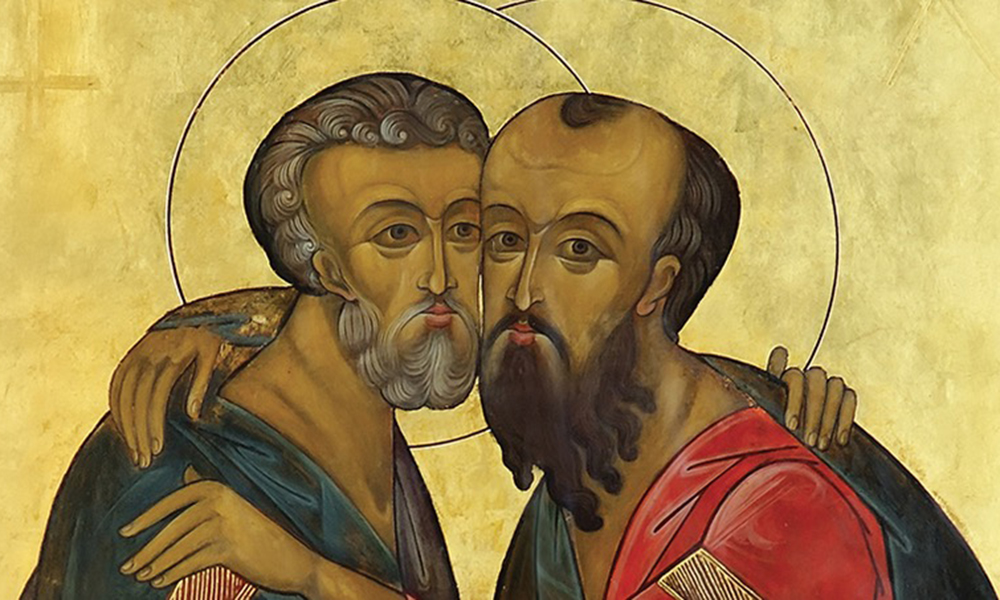As one enters St. Peter’s Square in Rome and approaches the magnificent basilica, one’s vision is overwhelmed by the sheer size of the structure and Michelangelo’s dome that sits atop it. So it would be understandable if one were to enter it without noticing the two monumental statues that stand at either side of the steps leading up to the front doors of the basilica. Huge statues of St. Peter and St. Paul greet pilgrims at the threshold of the holy place as a testimony to the unifying power of these great apostles. Peter and Paul are twin pillars for our Church, if you will. They constantly witness to us the two necessary elements of our Catholic faith: the service of Church authority (Peter) and the outreach of mission (Paul). That is fitting because we need both their teaching and their grace to guide us in our pilgrimage toward our good destiny.
In the years I spent studying in Rome, I had many occasions to reflect on the reality of Peter and Paul as brothers, co-apostles and holy teachers of the Catholic faith. The Church places these two apostles together in a single common feast day and celebrates their memory as one. Both lived, taught and performed their final ministries in Rome (although at different times), and both gave their final witness in Rome through their martyrdom.
Theirs is a unified witness, but it has two unique expressions, as if, in a symbolic way, the Lord had sent them out “two-by-two” to Rome as he had sent out all his apostles on their missions. Both their differences and their union in the Faith symbolize something that is vital for the life of every believer: that in the Catholic Church all gifts and authentic expressions of faith in Christ find their greatest fulfilment. The Preface to the Eucharistic Prayer of the Mass for their feast day expresses that concept beautifully:
For by your providence, Father,
The blessed Apostles Peter and Paul bring us joy:
Peter, foremost in confessing the faith,
Paul, its outstanding preacher,
Peter, who established the early Church from the remnant of Israel,
Paul, master and teacher of the Gentiles that you call.
And so, each in a different way
Gathered together the one family of Christ;
And revered together throughout the world,
They share the martyr’s crown.
Many Catholics do not fully appreciate that this union of Peter and Paul is found in tangible form to this very day in the coordination of the pope with the bishops in their guidance of the Church, particularly in administering the sacraments and teaching the Faith. Our Catechism explains it so well:
“Sacramental ministry in the Church, then, is a service exercised in the name of Christ. It has a personal character and a collegial form. This is evidenced by the bonds between the episcopal college and its head, the successor of St. Peter …. This pastoral office of Peter and the other apostles belongs to the Church’s very foundation and is continued by the bishops under the primacy of the Pope” (Catechism of the Catholic Church, Nos. 879, 881).
Above all, we must never forget that Sts. Peter and Paul were both martyred for the Faith. Their ultimate and greatest testimony to Christ was not in their teaching or in their shepherding of the Church but in their imitation of the Master, even to the point of a violent death. Martyrdom is not an end in itself but rather a demonstration of the ultimate value of loving others (that is, charity) as Jesus did — to the very last drop of his blood (Jn 13:1).
Both Tradition and Scripture place Sts. Peter and Paul at the center point of the Roman Empire in the first century, and we may see in this a divine purpose. Perhaps God wanted the blood of these two great men to form the seed bed of the Church, to nurture the Church at its beginnings with the strongest possible outflowing of grace. The blood of anyone who dies for Christ is of great value, but how much more so is the blood of the two great evangelizers of the world!
As we celebrate the feast day of Sts. Peter and Paul, we must ask ourselves a final question: How will these great apostles strengthen our own Christian witness this year? We may not be called to martyrdom like them, but each of us has our own testimony to give. With Peter, let us reaffirm our fidelity to the Church and to our Catholic identity amid a culture that is often hostile to faith. Like Paul, let us pursue the holiness that alone transforms the world.
Bishop Felipe J. Estevez is bishop of St. Augustine, Florida.

